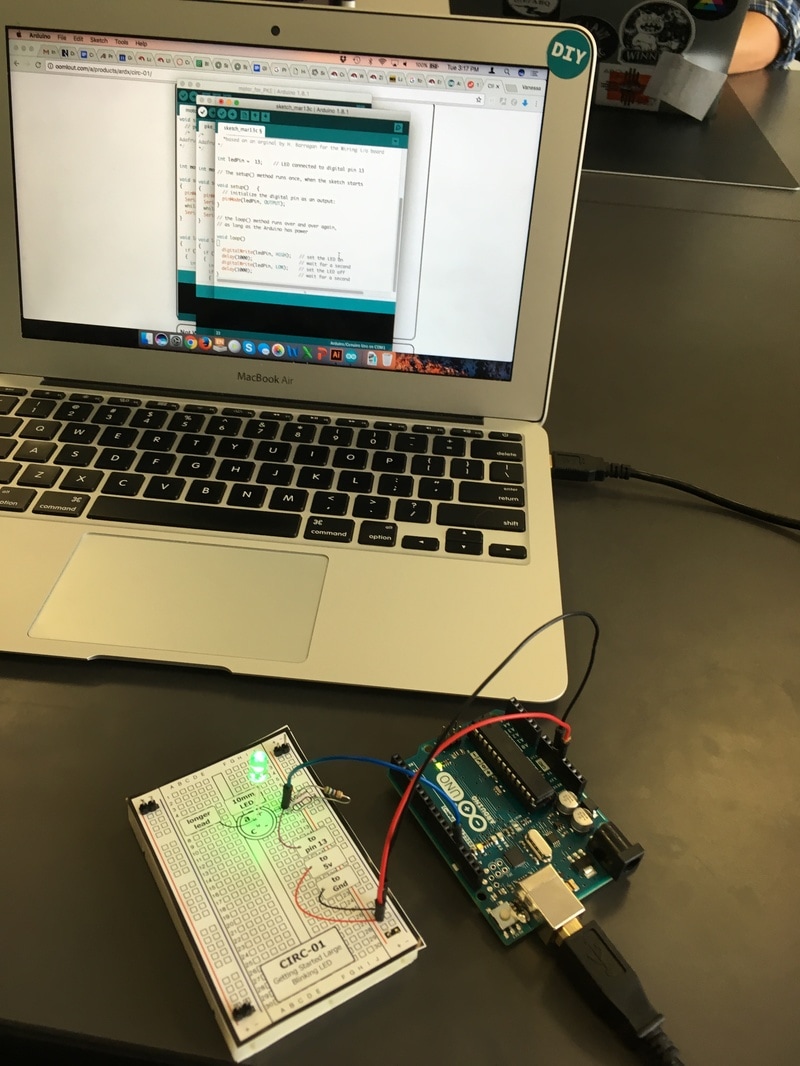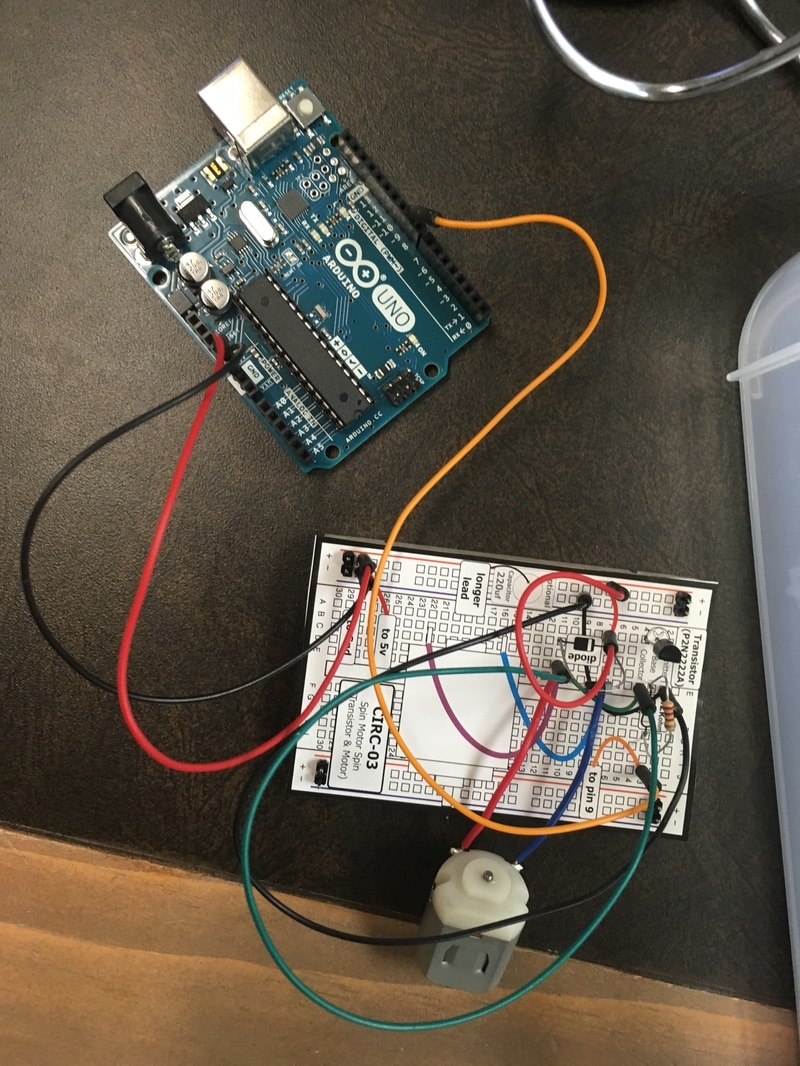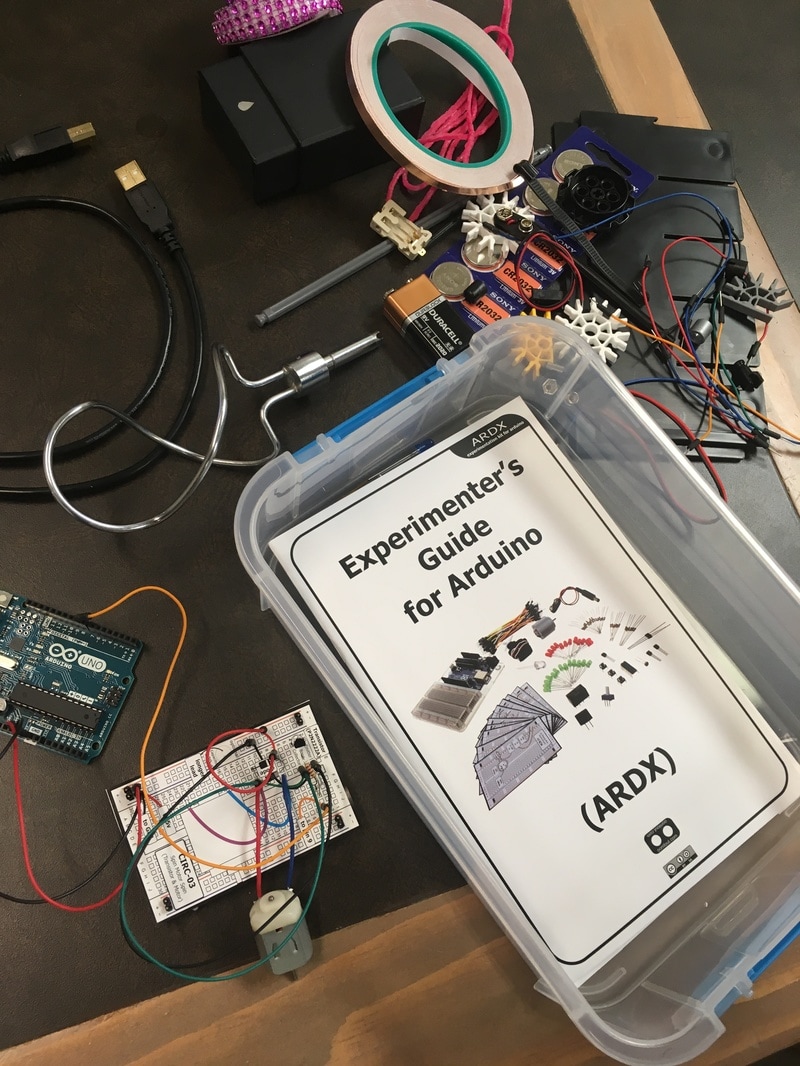|
What does it mean to make something abstract or conceptual? A number of years ago, someone posed a question about having an abstract experience. In response, I sewed a Möbius strip. Although I knew I would only need to sew one side, when my presser foot ran over the already-stitched down edge, it completely violated my expectations. I made four more, and each time, felt a little frisson of delight as my presser foot approached the stitching. As if it would be different on the third or fourth try. I don't think I learned anything new in doing so, but it was a memorable experience. Building on that, as I am working on projects, I am also trying to make progress on constructs. As a constructionist, this is pretty normal for me. So, what have I been making and making progress on lately? My first Arduino project! I am trying to make a PKE meter. My first attempt at getting my motor to spin was a fail. I had zero idea what went wrong. A friend gave me advice:
And then Chris asked me something about how or why it worked. Well, THAT metaphorical lightbulb did not go on. I have no idea why it worked, or how it worked. Meaning I made progress on my device, and maybe developed a little self-efficacy for following Arduino directions, but not much else. Still, I plunged ahead, and found directions for making a motor spin. I followed them. And now I have a motor that spins! But still no understanding. However, I do now have lots of ideas. And lots of questions.
All of these questions show progress on my framing of the problem. I am getting further into the problem. And starting to see the affordances and constraints of my approach. So I went and dug through the random stuff in the lab, and this is what I have to work with now: So, how is this helping me make progress on the construct of framing agency?
A friend offered to just make this thing for me. I said 'Great, but I am still going to try to make one myself.' Others have offered to sit with me and walk me through this. And so far I have turned them down. Part of that is because I want to do this myself. I want to be able to frame and reframe as I go. But if I am honest, part is because I think it will be clear just how little I know about coding and electronics. I am not worried about that, but rather what might happen as a result. Someone might feel the need to explain it all to me. And right now I am chasing a goal, and learning just the bits I need to to make progress. I think people probably do this quite a bit. I don't want it to become schoolish. I want to puzzle and tinker my way to making what I want to make. This type of need-to-know is found repeatedly when we try to insert learning into making. This reminds me of the work by Leona & Rich on students' use of engineering versus scientific models of experimentation, and how there might be a somewhat natural progression from engineering to scientific approaches. As a former geologist and current learnign scientist, I do know the scientific model of experimentation. But as a designer, I favor the engineering model, tinkering my way to making it work. I feel more sense of framing agency. Maybe there will come a point where I reframe my goal to be able learning how my PKE meter works. Though I suspect any such framing will be driven only by it not working. So, what am I making progress on? NOT on programming or circuits. But I am understanding better why attempting to insert learning goals into making goals might fail!
0 Comments
Imagine you have a brick, a string, a paperclip, and chewing gum. Come up with as many possible uses of them as you can.
Does doing problems like this make you more creative? While you can get better at tasks like this—tasks that are context light or context free—such tasks don't appear (from the research literature) to enhance creative capacity in disciplinary/domain-specific settings. Creativity seems to be discipline-specific. And this makes sense. Many people feel their creativity is welcomed in certain places (creative writing, art class) and unwelcome in others (math class?). But this also varies across people, mostly based on the experiences they have had. Some people feel very creative in mathematics yet feel rigid and constrained in prototypically creative spaces. So one of the things we are exploring is how to reframe this problem. If giving people creativity tasks is not the answer, perhaps the problem is not with the tasks themselves, as much as the instructional design surrounding the tasks. Or perhaps we need a continuum of tasks, stepping people from tasks that invite their creativity to those that repel it. I suspect we need some practices as well, some scaffolds to fade. So the questions I have are: How might we design learning experiences so that learners get more reflective/metacognitive about the strategies they use to be (un)successfully creative, and the conditions that (dis)invite their creativity? How can we foster a willingness to approach problems/situations as malleable/reframable? What practices/tools could help in this endeavor? I think the construct I want to develop is framing agency—that is, the ability to take ownership of problems/situations and shape them, flip them, find their tractable parts, their movable parts, and rework them into something better. Framing agency is something I have and use daily. Having spent some time in situations where I wasn't comfortable being my weird, creative, nerdy, playful self, I am keenly aware how context-dependent agency is. Having suppressed that part of myself for the better part of 5 years, and then having come back to myself, I feel like I have good grounds for comparison. I am happier and do more interesting, more fulfilling work when I have it. |
VanessaDesigner and researcher, researching designing. Archives
January 2018
Categories
All
|



 RSS Feed
RSS Feed
